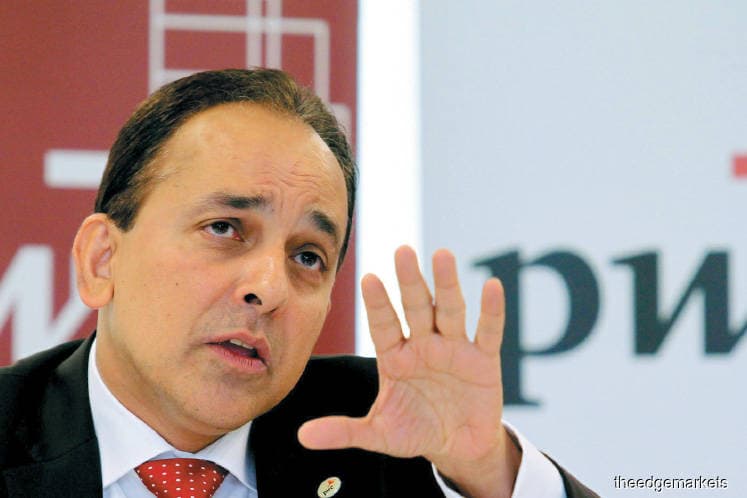
This article first appeared in The Edge Financial Daily on August 30, 2018
KUALA LUMPUR: About 32% of the most impactful fraud suffered by organisations in Malaysia were committed by the senior management, compared with 24% globally, said PwC Consulting Associates (M) Sdn Bhd, citing a recent survey.
PwC Malaysia managing partner Sridharan Nair noted that the figure forms part of the 69% of the most impactful fraud suffered by organisations in Malaysia which were committed by internal fraudsters, versus 52% globally.
“If leaders [of the organisations] don’t set the right tone, this sends the message that such behaviours (bribery and corruption) are acceptable,” he told reporters yesterday at a media briefing in conjunction with the launch of PwC’s 2018 Global Economic Crime and Fraud Survey findings for Malaysia.
He saw the high number of fraud committed by senior management as “a worrying trend”, because they can always “override controls” over fraudulent acts, even if those are picked up by detection systems.
Meanwhile, 35% of the respondents reported suffering bribery corruption in the last two years, which grew from 30% in 2016. Note that it was 19% in the 2014 survey.
The survey showed that 11% of respondents in Malaysia admit to having been asked to pay a bribe. This is the lowest, in comparison with neighbouring countries, such as Indonesia at 49%, followed by Vietnam at 39% and the Philippines and Thailand at 17% and 15%, respectively.
Nevertheless, as 69% of the respondents were from the C-suite, PwC Consulting Associates’ forensic services & risk consulting leader Alex Tan believed that those who admit to being asked for a bribe should be higher than surveyed.
In totality, economic crime in Malaysia has risen over the last two years as some Malaysian organisations appear to be ambivalent about addressing the risks of bribery and corruption.
Citing the survey, Tan noted that economic crime in Malaysia has risen over the last two years after 41% of respondents indicated they suffered fraud or economic crime, versus 28% in 2016.
Tan said the three most common economic crimes in the last two years were business misconduct, asset misappropriation, as well as bribery and corruption.
“It is [of concern] that some Malaysian organisations appear to be ambivalent about addressing the risks of bribery and corruption.
“Having a strong corporate culture advocating zero tolerance towards fraud is important. But without sufficient controls in place, organisations risk allowing economic crimes to fall through the cracks,” Tan said. About 42% of respondents believed corporate culture to be the most effective strategy in detecting economic crime, said Tan.
“Unfortunately, only 27% of respondents detected fraud through corporate controls, such as suspicious activity monitoring and internal audit,” said Tan, adding that disparate processes like weak internal controls often lead to poor internal transparency, impacting trust among employees.
Nonetheless, he stressed that being reactive can also damage a company’s reputation or brand strength.
The survey also highlighted that only 4% of respondents in Malaysia said fraud was detected via internal audit, versus 14% globally and 16% across Southeast Asia.
Tan said the lower figure in Malaysia is due to internal audit teams being under-resourced in terms of technology.
While affordability of technology seems to be the case for organisations, Tan said: “I don’t really buy that because we’re not asking to put a Rolls-Royce in that company, these companies just need something adequate.”
“Organisations should be empowering their internal audit team and providing them with sufficient technology that will enable them to detect suspicious patterns and suspicious trends,” said Tan, but stressed that nothing companies do will prevent crime in totality.
Additionally, Tan said organisations should take proactive measures on risk assessments.
Noting that 19% of respondents did not perform any form of risk assessment in the last two years, which is almost double the global average. Tan viewed this as disconcerting, considering the level of preparedness among Malaysian companies.
Sridharan concurred, saying organisations could first identify the weaknesses and decide on what to invest in later on.
22% of Malaysian respondents reported experiencing cybercrime in the past two years, versus 31% globally. Sridharan highlighted that the number of cybercrime could be higher as they might be unaware of being cybercrime victims.
PwC’s 2018 Global Economic Crime and Fraud Survey involved 7,228 respondents from 123 countries. The 7,228 respondents included 124 Malaysian respondents, about half of which were from listed organisations while 4% were from government entities.